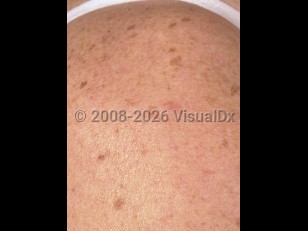Familial leiomyomatosis cutis et uteri
Alerts and Notices
Important News & Links
Synopsis

Leiomyomatosis cutis et uteri, also known as multiple cutaneous and uterine leiomyomatosis (MCUL) and Reed syndrome, is an autosomal dominant condition characterized by multiple leiomyomas (benign smooth muscle neoplasms) on the skin and uterus. MCUL is a rare condition, reported in approximately 200 families in North America and Europe. A subset of MCUL patients have a predisposition to renal cell carcinoma (RCC), and this condition is called hereditary leiomyomatosis and renal cell carcinoma (HLRCC). Both MCUL and HLRCC result from a heterozygous germline mutation in the fumarate hydratase (FH) gene on chromosome 1q42.3-q43. The FH gene encodes the enzyme fumarate hydratase, which has different isoforms responsible for converting fumarate to malate in the Krebs cycle. Somatic mutation or loss of the wild-type FH allele interferes with FH activity, resulting in accumulation of fumarate. The excess fumarate is believed to contribute to tumor development through fumarate-dependent succination of cysteine residues on certain cellular regulatory proteins, such as iron regulatory protein 2 (IRP2).
Affected individuals often first present to dermatologists with cutaneous leiomyomas. The average age of onset of cutaneous lesions is 25 years, although onset in childhood or later adulthood is not uncommon. Smooth muscle fibers that make up cutaneous leiomyomas arise from arrector pili of hair follicles or vascular smooth muscle. Lesions very rarely spontaneously regress and may occasionally increase in size. Patients often report pain or paresthesias with touch or cold temperatures.
Uterine fibroids in MCUL tend to have early onset and severe symptoms compared with spontaneous fibroids. Onset is typically earlier than age 30, compared with age 40 for spontaneous fibroids. Symptoms include menorrhagia, irregular menses, pelvic pain, and sometimes infertility or subfertility. Half of women with MCUL require hysterectomy or myomectomy before age 30 due to symptom severity.
Many different FH mutations have been identified, although there is no clear association between specific mutations and development of the HLRCC variant. Families with known HLRCC have variable penetrance of papillary RCC in individuals with the familial FH mutation. RCC may present with hematuria, low back or flank pain, and abdominal or flank mass. These tumors also have an early age of onset (median onset is 44 years) compared with spontaneous RCC and are typically unilateral but may be bilateral or multifocal. RCC in these patients is aggressive, with a higher-than-expected rate of metastasis (50%) and mortality, even when lesions are small. Adrenal cortical adenomas have also been reported in some patients with HLRCC, although this association is not certain. Most are nonfunctioning, but some adrenocorticotropic hormone (ACTH)-secreting tumors have been identified.
Affected individuals often first present to dermatologists with cutaneous leiomyomas. The average age of onset of cutaneous lesions is 25 years, although onset in childhood or later adulthood is not uncommon. Smooth muscle fibers that make up cutaneous leiomyomas arise from arrector pili of hair follicles or vascular smooth muscle. Lesions very rarely spontaneously regress and may occasionally increase in size. Patients often report pain or paresthesias with touch or cold temperatures.
Uterine fibroids in MCUL tend to have early onset and severe symptoms compared with spontaneous fibroids. Onset is typically earlier than age 30, compared with age 40 for spontaneous fibroids. Symptoms include menorrhagia, irregular menses, pelvic pain, and sometimes infertility or subfertility. Half of women with MCUL require hysterectomy or myomectomy before age 30 due to symptom severity.
Many different FH mutations have been identified, although there is no clear association between specific mutations and development of the HLRCC variant. Families with known HLRCC have variable penetrance of papillary RCC in individuals with the familial FH mutation. RCC may present with hematuria, low back or flank pain, and abdominal or flank mass. These tumors also have an early age of onset (median onset is 44 years) compared with spontaneous RCC and are typically unilateral but may be bilateral or multifocal. RCC in these patients is aggressive, with a higher-than-expected rate of metastasis (50%) and mortality, even when lesions are small. Adrenal cortical adenomas have also been reported in some patients with HLRCC, although this association is not certain. Most are nonfunctioning, but some adrenocorticotropic hormone (ACTH)-secreting tumors have been identified.
Codes
ICD10CM:
D25.9 – Leiomyoma of uterus, unspecified
Q82.8 – Other specified congenital malformations of skin
SNOMEDCT:
254767008 – Cutaneous leiomyoma
404043000 – Familial multiple leiomyoma cutis
D25.9 – Leiomyoma of uterus, unspecified
Q82.8 – Other specified congenital malformations of skin
SNOMEDCT:
254767008 – Cutaneous leiomyoma
404043000 – Familial multiple leiomyoma cutis
Look For
Subscription Required
Diagnostic Pearls
Subscription Required
Differential Diagnosis & Pitfalls

To perform a comparison, select diagnoses from the classic differential
Subscription Required
Best Tests
Subscription Required
Management Pearls
Subscription Required
Therapy
Subscription Required
References
Subscription Required
Last Reviewed:01/03/2022
Last Updated:01/09/2022
Last Updated:01/09/2022
Familial leiomyomatosis cutis et uteri

